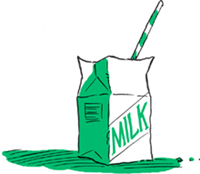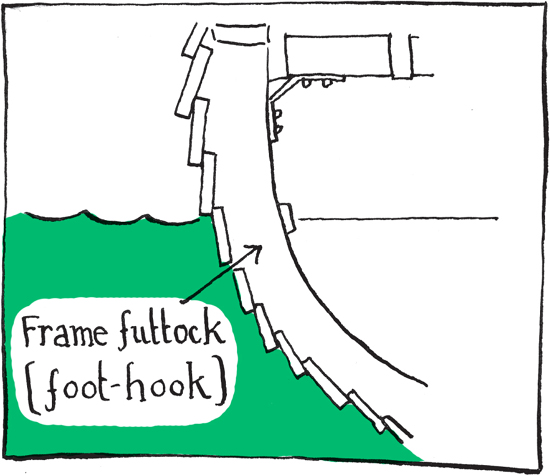
“You’re absolutely sure?”
“Yes, Gerritt, I’m sure. I know the difference between a thunk and a bong. Go hit the post yourself. The eighth one from the south stairwell goes bong.”
Ben took a bite of chocolate cake. He could tell from the shape of Robert’s eyebrows that the quiz wasn’t over.
He and Jill and Robert were back in a corner of the cafeteria where they’d never eaten before. They ate lunch in a different spot every day now, so Lyman wouldn’t know where to plant a listening device. Ben wished he could eat in peace, but every lunchtime ended up being a war council.
“So . . . this bong,” said Gerritt. “Is the tone high or low?”
“Low. Definitely low.” Ben took a long pull on the straw in his milk carton. His cake was gone, which meant he had to start in on the grilled cheese and salad. Always a sad moment.
“And is the sound solid, or is it more of a hollow sound?”
“Hmm . . .” Ben bit off a chunk of sandwich, chewed slowly, then swallowed, and took a sip of milk. “I’d say there’s some of each. The sound itself is pretty solid, but there’s a little bit of echo in there too. Like a gong—which rhymes with bong.”

Jill was done eating and held up her hand to interrupt before the quiz could continue. “Enough with the suspense, Robert. What’s all this about?”
“Simple: It’s about hooks. From the next clue, right? ‘After three hooks pass,’ and all that. I started a list last night, every kind of hook I could think of.”
“I did that too,” Ben said.
“So did I,” said Jill.
“Okay,” Robert said, “how many different kinds did you guys come up with?”
Ben said, “Coat hooks, cup hooks, grappling hooks, boat hooks, button hooks, fish hooks—”
Jill jumped in. “And iron pot hooks, for hanging pots in a fireplace. And picture hooks, chain hooks, meat hooks, like, in a butcher shop. And a weed hook, which is another name for a sickle—”
“And also door or window hooks,” said Ben, “like for screens.”
“Or a hook to replace a hand, like Captain Hook had in Peter Pan . . .”
Robert nodded. “Yeah, I got all those, and some other ones, too. And none of them seemed to connect with what we know about the school. But then, I started thinking like John Vining.”
Ben knew that name—they all did. John Vining was a ship’s carpenter, the man Captain Oakes had hired back in the 1780s to transform his huge brick warehouse into a school. Vining was also the person who must have figured out how to hide the safeguards.
Ben smiled as he chewed another bite of sandwich. Robert was about to show them how smart he was. Again. And since he was now able to feel less jealous and less annoyed about that, Ben was ready to be entertained.
Turning to Jill, Robert said, “Remember the name they used for the third floor of the school, on that coin Mr. Keane gave to Pratt?”
Jill nodded. “ ‘The upper deck.’ ”
“Exactly,” said Robert, “which is a shipbuilding term applied to the school building.” Looking at Ben, he said, “And what did they call the exact center of the school?”
“ ‘Amidships.’ ”
“Right—a nautical term. And that’s why it seemed logical that the word ‘hooks’ in this clue could also have some kind of nautical meaning, something to do with the way ships are built or described. So, I accessed the online Oxford English Dictionary through the Edgeport Public Library, and I did a Boolean search, and—”
“A what?” said Jill.
“A Boolean search—named after George Boole, a math guy. I wanted to find all the connections in the whole history of the English language between shipbuilding and the word ‘hook,’ so I asked the OED to search for ‘ship AND hook,’ with that word ‘AND’ in all capital letters. And when you search that way, it finds any definitions that include both those terms. And the dictionary found me a word: ‘futtock.’ ”
“What?” said Ben.
“Futtock,” Robert said. “It rhymes with ‘buttock.’ ”
“Lovely,” said Jill. “And what does this word that rhymes with ‘buttock’ have to do with posts in the hallway which make different sounds when poor Benjamin goes sneaking around hitting them with a baseball?”

As usual, Robert wasn’t going to be hurried. Ben used his napkin to hide his smile. He wasn’t sure which was more fun—Robert showing off his smarts, or Jill getting impatient about it.
“I’ll explain in a second. So, the OED is a fantastic research tool. A little more reading inside the definition revealed that this word ‘futtock’ is a combination of two words that sailors said together quickly: ‘foot-hook’—that’s right, hook! And to explain that, the OED quoted from a very old book about ship construction, written in 1611 by Captain John Smith.”
Ben leaned forward. “Really? The same guy who was saved by Pocahontas?”
Robert nodded and pulled a scrap of paper out of his pocket. “Yup, and Smith’s book, called The Seaman’s Grammar, says ‘Your rising timbers are the hookes, or ground timbers and foot-hookes placed on the keel.’ So, if Captain Oakes and John Vining are using that word with this nautical meaning, and they apply it to this building, what would those hooks be?” Robert quickly answered his own question. “Those big curved posts in the halls! And to seal the deal, this morning I checked in the rare books section of our library, and I found a copy of that very book by John Smith—with John Vining’s name written in it!”
Ben said, “And you wanted me to hit the posts to see if any didn’t sound like wood.”
“Exactly. ‘After three hooks pass, one will be brass.’ And bong is a brass sound.”
Ben was about to say that the count wasn’t right, but he saw his mistake.
“Oh . . . if you start counting at the post closest to the art room, then the post that goes bong is the fourth one—it all fits!” Ben had to grin. “That is very cool, Gerritt! Very!”
Jill smiled in agreement, but immediately said, “Still, it’s not like that solves the clue. And how come you couldn’t just look at the post and see it was made of metal instead of wood?”
Robert said, “I’m guessing that the post was painted carefully to look like wood, or else there’s a thin layer of wood glued on top of the brass, a veneer. And you’re right—we haven’t solved anything yet. But at least we know where to start looking.”
Jill scowled. “It’s not much help that the post is right out there in the hallway, and pretty close to the janitor’s room, too.”
“Which is why,” Robert said, “we need a really excellent camera.”
Ben nodded. “Sure, snap some pix, and we can study the post without having to stand there staring at it.”
“So . . . we all agree? ’Cause I located this sweet little camera with a great lens and huge megapixels—and Tom Benton could get it from Ace Camera so we’ll have it by tomorrow!”
Ben saw Jill start to frown. She didn’t like how Robert always took charge, or the way he had started talking about spending money the minute they learned about their superfund. Ben was expecting a sharp word or two, but suddenly her face softened.
“I vote yes,” she said. “Get the best camera you can. That pile of money is probably our most powerful weapon, so let’s use it!”
Robert grinned. “All right! Because I’ve got other ideas about tools and equipment, and some weapon systems, and it’s gonna take some real cash, so this is—”
He stopped talking, and Ben saw his eyes get wide. Robert’s smile vanished.
“Incoming!” he whispered. “It’s Wally, twenty feet away and closing in fast. You know what to do!”
Without another word, all three of them stood up, grabbed their things, walked quickly to the corner, and dropped off their lunch trays. Jill immediately headed out the west door onto the playground, and Robert left the cafeteria through the door that went into the Annex, the newer one-story part of the school.
That left Ben alone in the lunchroom, but he didn’t leave right away. He walked back to a table and sat down across from Luke and Bill.
“Hey guys, how’s it going?”
He smiled at them when they replied, but he barely heard them. He was watching Wally out of the corner of his eye.
The man was lousy at pretending to be a janitor. He was still back near the corner where they’d been eating, shoving his mop around in a circle. Wally was watching Ben, but his eyes kept darting to the doors where Jill and Robert had disappeared. He had been given the job of tracking the Keepers during lunch, and now two-thirds of them were missing.
Ben said, “That science quiz on Friday was tough, didn’t you think?” He acted like he was totally into a conversation with the two guys, and in less than fifteen seconds, it happened. Wally bolted toward the door Robert had used, and when he got there, he leaned his mop up against the wall, took one more quick glance at Ben, and then trotted out into the hallway.
The second he disappeared, Ben said, “Well, guys, gotta go!”
He was halfway through the door that led toward the old building when Mrs. Flagg stopped him.
“Do you have a hall pass?”
Ben wanted to shout, What is your problem, lady? You know I have a pass—I’ve been showing it to you every day after lunch for two weeks!
But he didn’t yell. He smiled sweetly and handed her the worn slip of bright yellow paper that both Mrs. Hinman and Mrs. Sinclair had signed.
“All right, you may go,” she said.
Ben bounced into the causeway and walked as fast as he dared, glancing back once to see if Wally was following. He wasn’t.
Which was good. Because Ben needed to make a quick trip to the office—that was the whole point of their sudden three-way split at lunch. And he got there in less than two minutes, with no sign of either janitor.
The school secretary looked up and then smiled at him.
Ben smiled back. “Hi, Mrs. Hendon. At lunch I noticed there’s a new janitor. I’d like to interview him for that project we’re doing on the school’s history—ask him about his first impressions of the old building. Can you tell me his whole name? I mean, I don’t want to walk up and have to call him ‘Mister Janitor’ or something.”
Mrs. Hendon nodded and started looking through a stack of papers. “He’s brand new in town, and I just got his paperwork this morning—although why they’re hiring someone at this time of year is beyond me. All right, here it is. His name is Wallace V. Robleton.” And then she spelled out the last name.
“Great,” Ben said. “Thanks! Well, see you later.”
Ben left the office and turned toward the library. Mission accomplished! He couldn’t help smiling—he loved this spy stuff.
He was also happy that the name wasn’t something common. With a name like Wallace V. Robleton, they could probably find out something about him on the Internet, maybe something useful. There was no telling what a careful search might turn up.
Ben had read a lot of history about real wars, and spying was always important—it was called intelligence gathering. To win a war, you had to learn as much as possible about your enemy.
Even if his nickname was Stumpy.